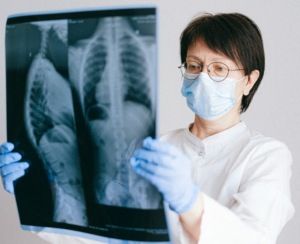News
Science Round-Up: How space tech could help detect breast cancer
This article is more than 3 years old.
If that doesn’t sound futuristic enough for you, how about the ongoing projects to enable the control of 20 drones all at once, or using X-rays to help us change the way we eat

Often as obscure as a spec in the night’s sky (photo: Anna Shvets/ Pexels)
It might not be obvious what links a violent collision between two distant neutron stars far out in the universe and a small cancerous lump in a human breast.
But Irfan Kuvvetli, a senior researcher at DTU Space, has invented something that could help detect them both.
He claims it makes it possible to more easily detect gamma radiation, and it could prove to be a significant invention.
What is used to explore space
For astrophysicists the detector could enable them to calculate where gamma radiation comes from as well as the power of its energy. Gamma rays are emitted when a star like a supernova explodes or when two neutron stars collide.
Eventually, this could help them to find out how different elements form and disperse in the Universe.
Could be used to find cancer
Gamma radiation is not only used in space, but also in healthcare. Some cancers for example are treated with gamma rays because they can kill cancerous cells.
In this field, DTU Space is collaborating with Kromek, the British company that manufactures radiation detectors for the pharmaceutical industry and others.
Complements traditional mammography
With this collaboration, the researchers hope to develop a scanning method that could be a complement to a traditional mammography.
Before the examination, the woman is injected with a tracer that accumulates in cancer cells and is visible thanks to the gamma rays. The technology paired with the detector from DTU makes it possible to locate precisely small cancerous tumours and allow the biopsy to be taken right away.
Work continues on both fronts
Researchers at DTU Space are now testing the new detector modules that Kromek manufactured according to their instructions.
While the DTU researchers are working towards an instrument for a future space telescope, Kromek can start developing a prototype of a medical scanning device that can be tested on patients.
Get motivation from knowing what you do
A meta-analysis of 121 studies shows that people are way more active if they have feedback on their activity from a watch or a phone. That is the conclusion of a team of researchers, mainly from Rigshospitalet, published in the British Medical Journal. Compared to the participants who do not get feedback, those who do increase their activity in a significant way. In fact, the typical participant walks 1,235 steps more daily and partakes in an extra 49 minutes of hard or moderate exercise a week. For the head of research, Jan Christensen, the result “should be seen in light of the fact that all research in the field shows that [it] will have a significant effect on both morbidity and risk of death”. He adds that increasing activity helps all groups of people.

Picture by cottonbro/ Pexels
Do you need money to stop smoking?
A new Danish study has figured it out for you. People in six towns were recently invited to sign up for funded smoking cessation courses, but the money was not used in the same way. In three towns, participants were promised a 1,200 kroner reward if they could remain smoke-free for six weeks. In the other three towns, the money was invested in advertising the course. The difference between the number of people singing up was not that significant, but the odds of being smoke-free after a year did show a difference. When given money to stop smoking, 32 percent were smoke-free after six months, and 29 percent were still smoke-free after one year. In the other towns, just 22 percent had quit smoking after six months and 18 percent kept on going after a year.
X-rays could help us change the way we eat
X-rays could be used to find what makes food taste good and what makes it feel soft to the bite. The SAXS method, which examines food in such way to a nanometre (one millionth of a millimetre), could lead to making healthier alternatives (chocolate bars, for example) taste better. SAXS is not yet widely used in food research. However, that might change as the Department of Food Science at the University of Copenhagen has acquired a new Nano-inXider instrument. Ultimately its research, commented Professor Jacob Kirkensgaard, who is also attached to the Niels Bohr Institute, could be used to make plant-based proteins more appetising to eat, thus preventing obesity and improving health.
Farmers and rescue workers could be getting help from multiple robots
The University of South Denmark and two private robot companies are collaborating on the HERD project: a bid to enable the use of multiple drones at the same time in agriculture and rescue work. “Current technologies work well when a farmer needs to control a single robot, but they are inadequate when multiple cooperating robots are in play,” explained Professor Anders Lyhne Christensen from the SDU. Being able to control a swarm of 20 drones instead of one would make a huge difference. HERD started in November 2021 with a view to running for four years.
Nitrates increase risk of babies being born with birth defects – research
Researchers from the Universities of Aarhus and Illinois (US) have confirmed previous research that suggests exposure to nitrate in drinking water could cause problems at birth. For Professor Leslie Stayner (University of Illinois), lead author of the paper, the most important question is whether the current limitations are enough to protect children. Mainly stemming from agricultural fertilisers, nitrates are one of the most commonly found pollutants in water. According to Stayner, further investigation would be justified.
New treatment for young people with meniscal tears
Surgery is normally recommended for youngsters with meniscal tears, one of the most common types of knee injury. However, according to researchers from the University of Southern Denmark (SDU) and several orthopaedic departments at Danish hospitals, you could also be treated by doing exercise. Their study observed 121 young people with meniscal tear, revealing that those who underwent surgery did not improve more than the group undergoing exercise and education with the option of later surgery. This could open up more options to treat these kinds of injuries.
Young children super social too – study
According to a study by researchers at the University of Copenhagen and Central European University, when young children look for hidden objects, they’ll keep searching if adults tell them they haven’t found all of them – even if they know that can’t be true. The same mechanism is at work when you check twice in the same place for something you know is not there … just because someone told you to do it. The study, which was published in the journal Open Mind at the end of 2021, uncovers some of the ‘super-social’ traits of humans – in this case how we pay special attention to others and spontaneously take into account others’ states of mind, goals, knowledge and beliefs, even when we shouldn’t.










































